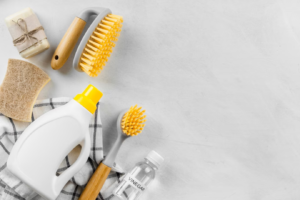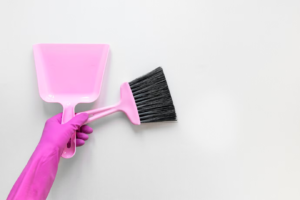The tiles in your home can accumulate quite a large amount of dirt and debris from outside, but you probably haven’t given much thought to the rust building up around it. While not particularly the first concern that pops to mind when we think about floor tiles, the buildup of rust can still ruin the appearance of your beautiful home, and can actually cause severe damage when left for too long.
What Causes Rust to Form on Tiles

Rust, also known as iron oxide, is the product of the reaction between oxygen and iron, and it has a very distinctive red brown color that is surely familiar to most of us. While the source of the iron may be easier to figure out as this is a common material used in tiles, you may be wondering where the oxygen comes from. It’s actually from the air and water, which is a popular culprit in areas like the bathroom and the kitchen where there are sinks around.
Step 1: Prepare the Tiles
Before you start cleaning the rust off your tiles, use a soft brush or cloth to gently remove any loose rust particles from the tiles to make the cleaning process much easier. Use as little force as possible to prevent scratching the tiles and gently scratch and scrape at the spot to get rid of as much of the rust as you can. Afterwards, make sure to remove all the particles that you managed to remove.
Step 2: Choose Your Cleaning Solution
There are a few cleaning solutions that can help you tackle your rust problem:
Commercial Cleaner
When looking for a commercial cleaning solution to leave your tiles sparkling clean, make sure to look for an all-purpose floor cleaner that can remove rust as well. Before using it, take the time to read through the label printed at the back as this contains the manufacturer’s instructions regarding use, safety and health precautions, doses and much more. Follow these recommendations to remove the rust from your tiles.
Lemon Juice
The high levels of citric acid in lemon juice makes it a very popular household cleaning ingredient for a reason. Apart from having antibacterial and antimicrobial properties, it’s also a great way to break down and remove rust stains from floor tiles.
To start, squeeze some lemon juice directly onto the affected area and leave this for around 10 to 15 minutes. When the time has passed, get an old and unused toothbrush and scrub at the stain to loosen up any rust debris. For much tougher stains, you can choose to add a pinch of salt onto the rusted area before scrubbing it again with your toothbrush.
White Vinegar
Acetic acid—the main ingredient in vinegar that gives it that distinct smell and flavor—is actually found in many commercial household cleaning products, which is why many swear by vinegar as a household cleaning essential. Pour some vinegar onto the stained area and leave it to soak.
The amount of time you leave it to sit will depend on the severity of the rust stains, with older and stubborn stains requiring an hour or two and lighter stains needing only around 5 minutes. When the appropriate amount of time has passed, get a soft brush or an old toothbrush and use this to gently scrub at the area, adding a pinch of salt over the rust stain should you need some help.
Baking Soda
You can also remove some lighter rust stains by creating a baking soda paste. To do this, simply pour some baking soda into a bowl and add a few drops of water until you’re left with a thick paste. Pour this paste onto the rust stain and begin gently scrubbing at it with a soft brush, an old toothbrush or a clean cloth.
Step 3: Clean the Area
Once you’ve removed all traces of rust with your chosen cleaning solution, get a clean cloth and dampen this with water before using this to wipe away all remnants of the cleaner. Feel free to bring a bowl or bucket of water so that you can rinse out the cloth as much as needed. When you’re left with a smooth and lustrous tile, give it a final wipe with another clean cloth before leaving it to dry completely.
How to Prevent Rust from Forming

Regular Cleaning
The easiest but most effective way to stop the formation of rust on your tiles is to incorporate this into your regular household cleaning schedule. The removal of dirt, debris and spills will help prevent the development of rust more consistently over time.
Remove Excess Moisture
The formula that creates rust is the combination of both iron and oxygen, with water being a very common source of the latter. That’s why it’s important to address any leaks in your home as soon as possible, especially in areas with faucets like bathrooms and kitchens. These leakages can cause water to seep into your floors and lead to the formation of rust.
With that being said, it’s also crucial to properly dry your floors after every cleaning as any remnants of moisture left could lead to another rust problem for you to deal with. Another way to mitigate the moisture levels in a room is to ensure that the area is properly ventilated as this helps reduce humidity levels and the buildup of excess moisture. This can be done with the help of windows, exhaust fans and dehumidifiers.
Scheduling a Cleaning with Luce Home
The real secret to preventing rust from forming on your tiles is to ensure that your home is thoroughly and properly cleaned often, but not everyone has the time to do this. Luckily, Luce Home offers a wide range of customizable and affordable cleaning packages and services to cater to your unique household cleaning needs, as well as your crazy and busy schedule.
Our professional cleaners are equipped with years of training and experience to tackle even the worst of messes and leave your home sparkling clean after every session. Luce Home is here to make a clean home effortless and easy!
Schedule your first cleaning appointment today!
